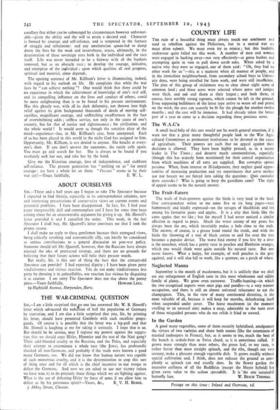COUNTRY LIFE
THE ruin of a beautiful thing must always touch our sentiment and tend to rebellion against the Philistines, but in a mortal war we must often submit. We must even try to rejoice ; but this laudable endeavour quite failed me this week. A number of men and women were engaged in hacking away—not very effectively—at gorse bushes and attempting quite in vain to pull down scrub oaks. When asked by a native why they were so engaged, one of them said: " Oh, they had no other work for us "—this at a moment when all manner of people, and in the immediate neighbourhood, from secondary school boys to Univer- sity dons, were being enrolled for farm work, and were still insufficient. The plan of this group of reclaimers was to clear about eight acres of common land ; and those acres were selected where gorse and juniper were thick, and oak and thorn at their largest ; and both these, of course, have terribly strong taproots, which cannot be left in the ground. Even supposing bulldozers of the latest type arrive to waste oil and petrol on the work, the area can scarcely be fit for the plough for another twelve months ; and the cost will be immense. It had already taken the better part of a year to come to a decision regarding these. precious acres.
The W .A.G 's
A small local folly of this sort would not be. worth general attention, if it were not that a great many thoughtful people look to the War Agri- cultural Committees as permanent institutions to be devoted to the cause of agriculture. Their powers are such that no appeal against their decisions is allowed. They have been highly praised, as in a recent leader in The Times ; and deserve much commendation, especially (though this has scarcely been mentioned) for their central organisation from which machines of all sorts are supplied. But corruptio oprimi pessima. When, from interest or ill-judgement, they neglect gocid oppor- tunities of increasing production and try experiments that serve neither use nor beauty we are forced into asking the question: Quis custodiet ipsos custodes ? Who is going to keep the guardians sane? The right of appeal seems to be the natural answer.
The Fruit-Eaters
The wails of fruit-growers against the birds is very loud in the land. One correspondent writes to me some five or six long pages—very humorously and kindly expressed—on the ravages of blackbirds and tits among his favourite pears and apples. It is a pity that birds like the same apples that we like ; but for myself I had never noticed a similar affection in regard to pears. Much the worst enemy of my pears has always been the ant, which invariably makes a hole close to the stalk. The answer, of course, is a grease band round the trunk, and. with the birds the throwing of a reel of black cotton to and fro over the tree becomes a popular device. The worst bird enemy if you live by a river is the moorhen, which has a pretty taste in peaches and Blenheim oranges, which you would think were quite outside his natural taste. But one never knows. What a harpy, for example, of wall peaches is the grey squirrel, and it will also fall to work, like a sparrow, on'a patch of wheat.
Neglected Manna
September is the month of mushrooms, but it is unlikely that we shall see any enlargement of English taste in this most wholesome and edible family of plants. We grow even narrower. Truffle-hunting—in which the two recognised experts were once pigs and poodles—is a very narrow occupation, and there is still an almost universal reluctance to eat the champignon. This, in the view of many continental dietetists, is the most valuable of all, because it will keep for months, dehydrating itself when suspended under cover. The horse mushroom (at the moment swelling to an unusual size) makes a soup, admirably to the taste even of those misguided persons who do not relish it fried or stewed.
In the Garden
A good many vegetables, some of them recently hybridised, amalgamate the virtues of two varieties and share both names (like the estaminets of married innkeepers in France), but, as it seems to me, much the best of the bunch is seakale-beet or Swiss chard, as it is sometimes called. It grows more strongly than most others, the green leaf, to my taste, is rather better than most straight spinach, and the ribs, though not very savoury, make a pleasant enough vegetable dish. It grows readily without special cultivation and, I think, does not exhaust the ground so com- pletely as spinach can and usually does. In the flower garden the excessive earliness of all the Buddleias (except the Meyer, hybrid) has given extra value to the sedum spectabile. It is 'the one Successful
Postage on this issue : Inland and Overseas, id.


























 Previous page
Previous page